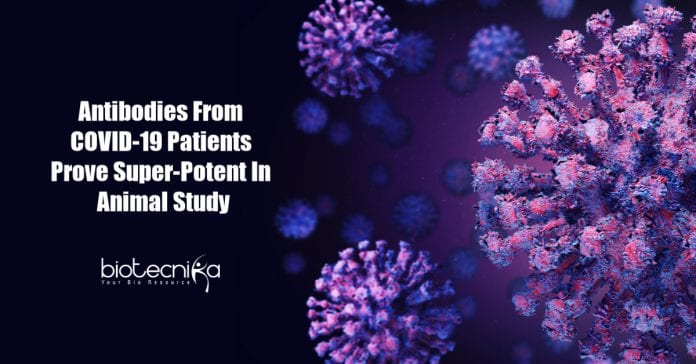Scientists at the Scripps Research, when tested in human cell cultures and animals, discovered that COVID-19 recovered patients carry powerful antibodies against SARS-CoV-2.
The study published in Science is a represents the rapid response to emerging viral pandemics and offers a platform for clinical trials and additional tests of the antibodies to develop potential treatments against COVID-19.
To reduce the level of virus and protect against severe disease, such antibodies could be given to patients in the early stage of COVID-19. The antibodies can be used as a temporary vaccination against COVID-19 in elderly people, healthcare workers, and in those who respond poorly to traditional vaccines or those suspected of recent exposure to the coronavirus.
Thomas Rogers, assistant professor of Medicine at UC San Diego and adjunct assistant professor at Scripps Research, who led the study, said they are now focused on making large quantities of these promising antibodies for clinical trials.
The world’s top public health priority is now to develop a vaccine or treatment for COVID-19. One approach is to identify antibodies in the blood of recovering patients, that can neutralize the novel coronavirus.
Mass producing these human antibodies using biotech methods, a potential treatment can be developed
for COVID-19, that could prevent severe disease and provide a vaccine-like effect that circulates in the blood for several weeks to protect against coronavirus infection. The approach has already been proved successful against the pneumonia-causing respiratory syncytial virus, commonly known as RSV and the Ebola virus.For this study, Rogers and his team of researchers collected blood samples from mild-to-severe COVID-19 recovered patients. At the same time, researchers at Scripps Research and IAVI developed cells that express ACE2, the receptor SARS-CoV-2 virus uses infiltrate human cells. They initially checked if the blood containing antibodies could bind to the coronavirus effectively and block them from infecting the test cells.
They isolated 1,000 distinct B cells that produce antibodies against the novel coronavirus from which the gene sequences of antibodies were obtained. Using the gene sequences, they produced the antibodies in the laboratory. And the team identified several antibodies that can block the coronavirus in test cells, even in small quantities.
It took only seven weeks for the scientists to do all this work. The antibodies could be used in patients as early as next January if the safety tests in animals and clinical trials go well.
Researchers intend to make these human antibodies against COVID-19 available to especially those in low- and middle-income countries. During their study, they also identified an antibody that can block the related coronavirus SARS-CoV, which caused an outbreak in Asia in 2002-2004. This gave the researchers a hope that they could develop antibodies that can at least provide partial protection against all coronaviruses.
The Bill and Melinda Gates Foundation, National Institutes of Health, the IAVI Neutralizing Antibody Center, the Pendleton Foundation, and the John and Mary Tu Foundation funded the project.



























